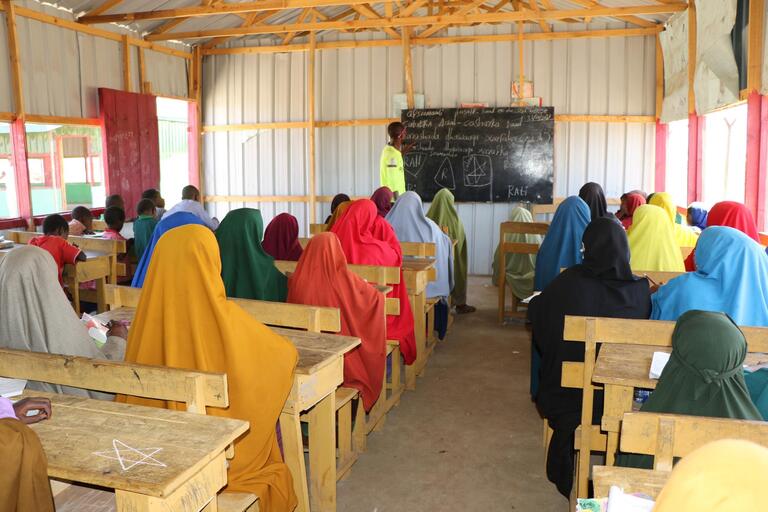Abdi, 30, föddes och växte upp i byn Barsanguni i nedre Juba-regionen i södra Somalia. Vid 15 års ålder gav han sig av till Somalias huvudstad Mogadishu för att studera, innan han själv blev lärare.
– Jag älskar att undervisa, säger Abdi. I klassrummet är jag alltid full av energi och entusiasm. Jag vill undervisa och bidra till att hjälpa nästa generation att bli morgondagens ledare.
NRC Flyktinghjälpen arbetar för att hjälpa flyktingar och fördrivna personer i över 30 länder runt om i världen, inklusive Palestina. Stöd vårt arbete idag.
En ny lågstadieskola
Abdi är en av lärarna vid NRC Flyktinghjälpens nya lågstadieskola i byn Barsanguni. Skolan byggdes 2020 för internflyktingar och deras värdsamhällen. Den består av fyra klassrum, ett kontor, fyra könssegregerade latriner och ett utrymme för lek och psykosocial verksamhet.
Både det lokala samhället och Jubalands delstatliga utbildningsmyndighet deltog aktivt i att hitta en plats för skolan, bygga den och rekrytera elever. Skolan drivs av en lokal skolkommitté, vars medlemmar är utbildade i skolledning, ledarskap och andra specialistroller.
Det fanns ingen skola i Barsanguni och barnen hade därför ingen möjlighet att få undervisning.Abdi Abdullahi
Totalt 587 elever (320 pojkar och 267 flickor) är nu inskrivna i skolan och deltar i förmiddags- och eftermiddagsundervisningen. Skolan följer den nyligen antagna somaliska läroplanen och undervisar upp till årskurs 3. NRC Flyktinghjälpen betalar de fem lärarnas lön.
Tre miljoner barn går inte i skolan
– Det fanns ingen skola i Barsanguni och barnen hade därför ingen möjlighet att få undervisning, förklarar Abdi. Innan Siyad Barre-regimens kollaps 1990 hade byn en skola med två klassrum, men den förstördes under inbördeskriget som följde. Sedan dess har byn inte haft någon skola och hundratals barn har inte fått någon undervisning.
Mer än tre miljoner barn i Somalia går inte i skolan och andelen barn som går i grundskolan är bland de lägsta i världen. Barnen i södra och centrala Somalia är värst drabbade. Föräldrar har ofta inte råd att betala skolavgiften och många barn har en lång och ofta farlig väg till skolan.

– Det är stimulerande att undervisa de här barnen och man känner ett stort ansvar när man ser hur ivriga de är att lära sig, förklarar Abdi.
– Eftersom det inte finns någon fungerande skola i byn, är både förmiddags- och eftermiddagslektionerna är fullsatta, fortsätter han. Barnen vill verkligen gå i skolan och en del går långa sträckor till skolan varje morgon.
Abdi har själv varit internflykting. Han tvingades att fly från sitt hem i Barsanguni och hamnade i ett läger för internflyktingar i Kismayo, cirka 45 km bort. Han ville gå i skolan men hans föräldrar slet hårt för att kunna sätta mat på bordet och hade inte pengar till skolavgiften. Men det hindrade inte Abdi från att förverkliga sina drömmar om utbildning.
Utbildning = hopp
Vid 15 års ålder gav sig Abdi av för att bo hos sin farbror i Mogadishu i hopp om att få gå i skolan. Farbrodern bodde också i ett flyktingläger, men här fick Abdi möjlighet att kostnadsfritt gå i en låg- och mellanstadieskola finansierad av FN.
Jag har alltid drömt om att bli en förebild för barn, att undervisa dem.Abdi Abdullahi
Efter lysande studieresultat som näst bäst i klassen fick han ett stipendium till Banadir högstadie- och gymnasieskola i Mogadishu. Här avlade han äntligen examen och återvände till hembyn Barsanguni för att undervisa sårbara barn vars föräldrar inte kan betala skolavgiften.

Abdi anser att utbildning är nyckeln till framgång för fattiga, konfliktdrabbade samhällen. – De saknar mycket, men trots alla utmaningar de möter, inspirerar jag dem alltid att studera för att de ska kunna få en ljusare framtid, säger han.
– Jag har alltid drömt om att bli en förebild för barn, att undervisa dem. Jag har både pojkar och flickor i min klass. De är alla aktiva. De vill verkligen lära sig.
– Jag vaknar varje morgon med motivationen att hjälpa mina barn, och alla barn i Somalia, till en bättre framtid. Jag tror att utbildning är det enda som kan få Somalia på fötter igen. Så jag kommer att fortsätta.


